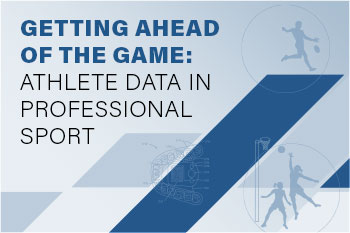Getting ahead of the game: Athlete data in professional sport

Australia needs to start a conversation about data governance in professional sport, including creating appropriate legal, organisational, and ethical limits around athlete data collection and use.
This discussion paper was developed by the Australian Academy of Science and the Minderoo Tech & Policy Lab at UWA Law School, with support from the Frontier Technology Initiative of Minderoo Foundation.
It reveals that Australian professional sports are collecting more personal information about athletes than they can meaningfully deal with. Concerningly, this data – which is personal, unique, and intimately revealing about individual athletes – amounts to excessively more information than has been proven to be useful. What are the stakes of exponential and unregulated growth in human monitoring for the workplace of professional sport, and beyond? What are the challenges, the opportunities, and the imperatives to act?
The co-chairs of the Expert Working Group that produced the discussion paper, Professor Toby Walsh and Associate Professor Julia Powles, outline the main issues and call for improved governance of data collection in professional sport.
Watch the launch event
Explore more
Dr Jason Weber
Professional Strength and Conditioning Coach, Sports Scientist
Dr Rachel Harris
Olympian; Sport and Exercise Medicine Physiologist
Executive summary
This discussion paper aims to ignite a conversation about the current reality that Australian professional sports are collecting extraordinary amounts of personal information about athletes. Concerningly, this data – which is continuous, personal, sensitive, and can be intimately revealing – amounts to excessively more information than has been shown to be beneficial to athletes, or to be capable of responsible, athlete-centric management. Increasingly, the marketing and commercial divisions of sporting leagues/associations and an array of third parties are eyeing this information as a monetisable asset, divorced from the individuals involved. This explosion in the amount of data being generated and in the number of parties who have taken an interest in it has dramatically shifted the risk–reward ratio against athletes. Paying attention to this growing mass of information about the mental and physical health and performance of athletes matters greatly. It has implications within sport and for anyone concerned about the direction of human monitoring in workplaces and public places well beyond the sporting landscape.
The rush to data presents two major problems which warrant serious consideration and a systemic response from the professional sport sector. The first concern is that professional sport increasingly faces a stark resourcing choice between a data-informed sports science and sports medicine (SSSM) approach with disciplinary knowledge, evidence, and translation at the centre, or a data-driven path where context and expertise are replaced by the centrality of often unproven and unvalidated data and technology. Such a transition risks replacing specialists who are highly trained in particular sports science disciplines – exercise physiology, biomechanics, strength and conditioning, motor control/learning and skill acquisition – with generalists who may be adept in data collection and analytics, but who lack deep domain expertise about the complexities and vagaries of human function, particularly in extreme environments and within small, highly-specific populations. Given the commercial realities of professional sport as a business with soft salary caps, trade-offs, and tight margins (even without the compounding strains of the global COVID-19 pandemic), this is a calculus to approach with great caution.
If the first concern is scientific, the second is human. This discussion paper focuses on data about athletes – people of extraordinary skill and dedication, living short, furious, intense careers at the frontier of human performance. But athletes also have lives before, during, and after sport. And the path of unrestricted data collection is also a path that treats the workplace of professional sport as a 24/7 zone of human monitoring and marketisation. Australian privacy law requires that personal information should only be collected where it is “reasonably necessary” for an organisation’s functions or activities. Following guidance from the leading federal privacy regulator, the Office of the Australian Information Commissioner, personal information that is “merely helpful, desirable or convenient”, “being entered in a database in case it might be needed in the future”, or collected as part of “normal business practice”, simply does not satisfy this requirement. This presents a real and present risk to the professional sport sector, where an extensive – and growing – amount of personal information is collected simply as a matter of routine. The governance of personal information has tremendous implications for professional athletes, but just as significantly, the degree of surveillance and monitoring tolerated in this space foreshadows what will be permitted in community sports, other workplaces, and everyday life.
The sheer complexity and scale of current athlete data collection and processing are increasingly challenging for any individual to comprehend. This complexity is compounded by the power relations that exist between athletes, clubs, and professional leagues/associations, as well as with third-party commercial entities who may sell up, be acquired, or go bankrupt, leaving the products and information they hold subject to a variety of shifting fates. This is precisely the sort of landscape where legal and ethical guardrails and a significant uplift in literacy and governance are necessary to ensure that athletes and athlete rights are protected and promoted, both in their own interest and in the public interest.






